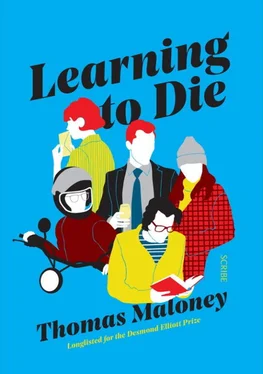Dan’s chair is positioned beside a sundial, which supports his beer at the critical straw-sipping height. After another gauntlet of uncomfortable niceties, he is relieved to find himself alone. It’s not just the patronising and the awkwardness. Talking, laughing, nodding and even smiling are now for him the equivalent of running up steps or standing on one leg: manageable, but hard physical work for which he has a limited capacity.
The sundial’s shadow rests on five, but it’s gone six — the error resulting from some combination of incorrect accommodation of latitude and longitude, the ellipticity of the earth’s orbit and British Summer Time. The inclined edge of the blade should lie parallel to the earth’s axis, of course. Dan closes his eyes and feels the planet rolling through space, northern hemisphere generously tipped, for now, towards the sun and basking in its summer bath of photons, whatever charged particles happen to penetrate its magnetic field, and a comically large number of neutrinos (a few trillion of the unassuming little buggers are landing in his beer every second). Why is the planet tipped over just the right amount to create the moderate seasonal variations so conducive to life? Ah. Good question. It got tipped sometime in the earth’s early history, of course, when the solar system was a jumble of rubble, possibly by the same humongous collision that created the moon.
But why just the right amount? And why are the sun’s temperature and distance perfectly tuned to ensure those photons are conveniently energetic (for photosynthesis) but arrive with moderate, non-roasting flux? And why, after all, have the dials on the fundamental forces been so precisely and perfectly adjusted to permit star formation, heavy elements, complex structures and the habitable universe? And why has space-time itself been configured slap bang in the sweet spot (two or four spatial dimensions would be non-starters for life)? Why, indeed. Ah. Dan smiles.
The anthropic principle and its more personal corollaries constitute, in his view, a refuge of almost limitless therapeutic power. The answer to so many questions. Why are life’s necessary ducks lined up in such a convenient row? Why did Daniel Mock come to be born, given the infinitesimal probability of his parents’ union, and those of his grandparents, and his great-grandparents, and every scattered ancestor forever before? Why did he contract motor neurone disease? Of all the weirdly fucked-up ways to die. Why not the more likely heart disease, or cancer, or, for that matter, nuclear war? Why didn’t that roadside wall of flint swat his incoming frame like a cricket bat? Why? Because. Because he’s asking the question.
Of course, many people reject this line of reasoning — not only the superstitious, the faters, but many of his scientific acquaintance, both theoreticians and experimentalists. There is a kind of hunger for something more, a kind of —
‘Sausage for your thoughts?’ says a voice. Dan opens his eyes. A skinny, shaven-headed man has taken hold of his precious straw and is using it to shepherd a wasp out of the glass. In his other hand he holds out two sauce-slathered hot dogs precariously; perhaps a little unsteadily.
‘Thanks,’ says Dan, maintaining his serene, happy countenance. ‘But I’ve already eaten. Thanks, though.’ The man is wearing faded black jeans and a faded Nick Cave T-shirt. Not very summery.
‘I’m James,’ he says. Not someone Mike has ever mentioned. Dan took him for the gardener.
Natalie Mock can’t quite hit it off with Mike’s groupies. They seem nice enough, but that’s just it — their politeness has the familiar flavour of crutches and wheelchairs. She feels the empty place next to her like a wound.
To an onlooker on the bank she’s already what she’ll one day become again: one of the girls. She hesitantly trails her fingers in the water, copying Victoria — it’s pleasant for a few seconds but then something brushes against them. She wipes them on the seat and smiles weakly.
James F. Saunders has judged his preparatory inebriation well. A few drinks give his present consciousness a literary distinction — a grandeur, even — usually reserved for the regretted past or the dreaded future. His world’s a stage, and hot sun pours down on him like a spotlight. The disabled man — presumably Mike’s tragic school chum — is called Dan. He asks James rather doubtfully if he’s a friend of Mike’s. Doesn’t like the cut of his jib.
‘I suppose so,’ shrugs James with a smile. It’s strange, but true. ‘Where is that slimy fucker, anyway?’
The man suppresses a smile. ‘Showing off in the punt. My wife’s with him.’
After a silence marking the moment when he might have made his excuses but chooses not to, James says, ‘So what were you thinking about?’
‘Luck.’
James is uncharacteristically ravenous and has just taken a bite of hot dog. The man seems disinclined to elaborate, so he valiantly shepherds the food to one side of his mouth.
‘Last week,’ he announces, ‘my landlady found four double-yolkers in a box of eggs. One in a million. Doesn’t win a penny.’
The man — was it Dan or Dave? — says something like, ‘Clustering,’ his voice slurring. He tries again. ‘Classic example of a rare event that occurs in clusters. Young chickens, big eggs. Not really one in a million.’ Ah yes, he was — is — some sort of science nerd. Doctor Who. Doctor Strangelove, maybe. James decides to advance the conversation, the dialogue, onto matters of substance.
‘What kind of bad luck put you in the chair?’ he inquires, simply. Mike never actually specified the disease.
The man calmly names it, the six Delphic syllables tripping off his tongue with no slurring. It is a nasty one. A clock ticker. I’m not the only one who’s cursed , thinks James. Worth remembering.
What he says out loud is, ‘I imagine one of the worst things must be the loss of — of autonomy . To be autonomous, your own person, in control of your life, able to be alone and act alone, you need your body to cooperate.’
The man frowns at this abrupt, Montaignian perspective on incapacity. ‘Technology helps,’ he says. ‘The chair, the computer, above all the internet.’ After a pause, he adds, ‘The other side of that dependency coin is that I appreciate the people I love — my wife and my family — and they me, I suppose — more than ever before. More than would have been possible before.’ This observation stings. ‘Are you married?’ pursues the man, relentlessly.
‘No. But I take your meaning. I’ve experienced something like it. Only a trauma makes love real. Without a trauma, love dissipates. Takes itself for granted. Wouldn’t you say?’
The man nods. ‘Yes, I would say that. Love — I’m not speaking grandly here, just about what everyone feels for the people closest to them — finds a purpose.’
Natalie fidgets. She can feel her legs and feet burning even under the sunblock. At last, Mike turns the punt and the river’s lazy flow helps them back over the same Ratty and Mole territory. As they round the tip of the island, a window between two willows slowly opens to reveal the pastel collage of the throng on the lawn. Burbling voices. She’s relieved to see Dan still where she left him, looking cheerful — in animated conversation with the oddly-dark figure of a man. A curtain of willow fronds drifts again across the scene, and she leans to one side, trying to identify Dan’s new friend.
‘Whoa there!’ says Mike, flailing for his balance as the punt tips. ‘That’s neither big nor clever.’ Victoria giggles and leans too, and some banter commences — but Natalie isn’t listening. Her eyes are still fixed on the duo beside the sundial. The landing stage approaches.
Читать дальше












